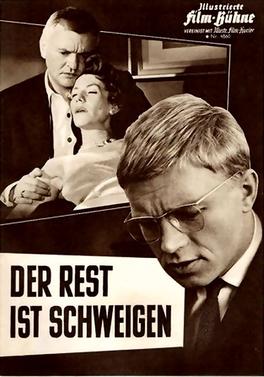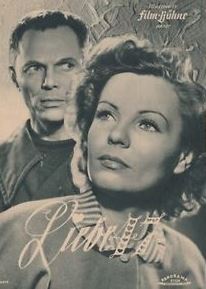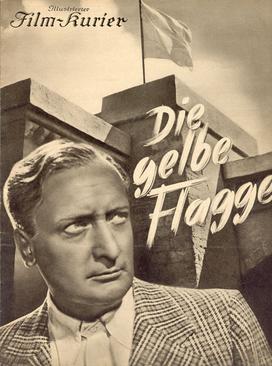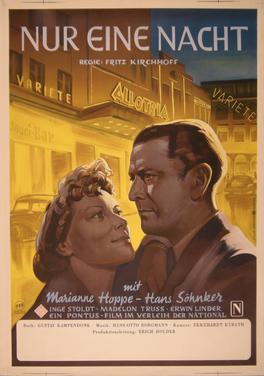
Herbert Achternbusch was a German film director, writer and painter. He began as a writer of avant-garde prose, such as the novel Die Alexanderschlacht, before turning to low-budget films. He had a love-hate relationship with Bavaria which showed itself in his work. Some of his controversial films, such as Das Gespenst, were presented at the Berlinale festival.
Jörg Schmidt-Reitwein was a German cinematographer. He has collaborated with director Werner Herzog on a number of projects. Among his many collaborations with other directors, Schmidt-Reitwein is known for shooting Alan Greenberg's acclaimed 1982 documentary about Jamaica and death of Bob Marley, Land of Look Behind.

Josef "Sepp" Bierbichler is a German actor.

The Man Who Was Sherlock Holmes is a 1937 German mystery comedy film directed by Karl Hartl and starring Hans Albers, Heinz Rühmann and Marieluise Claudius.

The Farewell is a 2000 German drama film directed by Jan Schütte. It was screened in the Un Certain Regard section at the 2000 Cannes Film Festival.

The Rest Is Silence is a 1959 West German crime film directed by Helmut Käutner. It was entered into the 9th Berlin International Film Festival.
The Ghost is a 1982 West German drama film directed by and starring Herbert Achternbusch. It was entered into the 33rd Berlin International Film Festival.
Wohin? is a 1988 West German drama film directed by Herbert Achternbusch. It was entered into the 38th Berlin International Film Festival.

The Last Year is a 1951 East German drama film directed by E.W. Fiedler and Hans Heinrich and starring Inge Keller, Hans Klering and Hermann Stövesand. It was made by the state-controlled DEFA in communist East Germany. Filming took place at the Johannisthal Studios in Berlin. The film's sets were designed by Wilhelm Depenau and Artur Günther.

Notarztwagen 7 is a 1976–1977 German medical drama television series directed by Helmut Ashley. It is regarded as a cult television series in Germany. Thirteen 25 minute episodes were produced for ARD and it aired from 1 December 1976. Notarztwagen means "Emergency Doctor Vehicle". The series portrays the contemporary life of a rescue team, emergency physician and paramedics. It is filmed in and around Frankfurt as well as occasionally in Wiesbaden and set at BG Trauma Clinic Frankfurt am Main. The screenplay was written by Bruno Hampel. The theme tune was composed by Peter Thomas.
Hades is a 1995 German drama film directed by and starring Herbert Achternbusch. It was entered into the 45th Berlin International Film Festival.

Love '47 is a 1949 German drama film directed by Wolfgang Liebeneiner and starring Dieter Horn, Hilde Krahl and Sylvia Schwarz. It was part of the cycle of rubble films made in post-war Germany. A young man and a woman about to commit suicide by jumping into a river, recount to each other their experiences of the Second World War and the struggles of the immediate post-war situation. Eventually they convince each other that life is worth living after all.
The Bone Man is a 2009 Austrian film directed by Wolfgang Murnberger. The script is based on the novel The Bone Man by Austrian author Wolf Haas.

Robert and Bertram is a 1939 German musical comedy film directed by Hans H. Zerlett and starring Rudi Godden, Kurt Seifert, and Carla Rust. It premiered in Hamburg on 7 July 1939. It was based on the 1856 play Robert and Bertram by Gustav Räder about two wandering vagrants which had been adapted into several film versions including a Polish film of the same title the previous year. It was set in 1839.

Barbara Redl is an Austrian actress.

Travelling People is a 1938 German drama film directed by Jacques Feyder and starring Hans Albers, Françoise Rosay and Camilla Horn. It is a circus film.

The Yellow Flag is a 1937 German drama film directed by Gerhard Lamprecht and starring Hans Albers, Olga Chekhova and Dorothea Wieck. It was shot at the Babelsberg Studios in Berlin. The film's sets were designed by the art director Ludwig Reiber. Location filming took place in Yugoslavia.
The Love Trap or The Love Cage is a 1925 German silent film directed by Erich Schönfelder and Richard Eichberg and starring Hans Wassmann, Maria Reisenhofer and Herbert Paulmüller. The film's sets were designed by the art director Kurt Richter.

Only One Night is a 1950 West German drama film directed by Fritz Kirchhoff and starring Marianne Hoppe, Hans Söhnker and Willy Maertens. It was shot at the Tempelhof Studios in West Berlin. The film's sets were designed by the art director Ernst H. Albrecht. Location shooting took place on the Reeperbahn in Hamburg.

The Man Who Couldn't Say No is a 1938 German romantic comedy film directed by Mario Camerini and starring Karl Ludwig Diehl, Karin Hardt, and Leo Slezak. It is a remake of the 1936 Italian film But It's Nothing Serious also directed by Camerini. It was shot at the Halensee Studios in Berlin. The film's sets were designed by the art directors Gabriel Pellon and Heinrich Richter.














